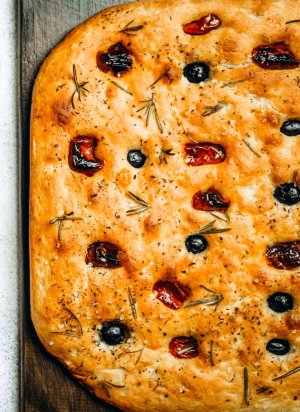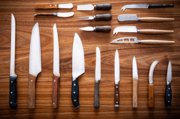Focaccia herbed bread
Focaccia Bread Recipe
Focaccia bread, a staple of Italian cuisine, carries the essence of the Mediterranean with every bite. Known for its olive oil-infused texture, golden crust, and herbs, this flatbread has won the hearts of bread enthusiasts worldwide. The recipe I am sharing is unique because I’ve incorporated tomatoes and olives, which add depth and complexity to the traditional Focaccia. The saltiness of the olives, combined with the sweet and tangy taste of the tomatoes, creates one damn amazing piece of crusty bread! Once you’ve got the hang of it, you’ll find yourself making it over and over again!
What Is Focaccia Bread?
The origins of Focaccia bread can be traced back to ancient times, with various cultures putting their unique spin on this bread. In ancient Rome, “panis focacius” was a flatbread cooked on a hearth or fireplace, and its name likely derives from the Latin word “focus,” meaning hearth.
Focaccia is such a great and easy bread to make. It can be made thick or thin, crunchy on top or not, but it is almost always soft in the center. I like mine
Why You’ll Love This Recipe
• Versatility: Serve this bread as an appetizer, a side dish, or even a main course. Focaccia pairs beautifully with salads, soups, and various entrées.
• Customizable: The basic recipe is just the beginning. You can experiment with different toppings like caramelized onions, minced garlic, shredded Parmesan, or fresh herbs to make it your own.
• Simple Ingredients: Made with pantry staples like bread flour, olive oil, yeast, and coarse salt, this recipe doesn’t require any exotic or hard-to-find ingredients.
• Texture Perfection: With a golden crust on the outside and a soft, chewy inside, this focaccia offers a texture that’s irresistible. The dimpling technique ensures the olive oil and toppings infuse every bite.
How To Make Focaccia Bread
This great recipe adapted from one I discovered long ago is easy to make and delicious with whatever you choose to put on it. I don’t include measurements for the toppings because you can add whatever amounts you like—some people like a few ingredients scattered on top, and some like it piled high. Remember to scroll down the page to the recipe card for full recipe instructions.
Ingredients For Focaccia
• 1 pkt rapid rising dry yeast
• warm water
2 Tblspn sugar
2 cups bread flour
• 1 tspn coarse salt for sprinkle on top
• Half cup olive oil
Directions
• Prepare the Dough: Proof the yeast in the bowl of a stand mixer by combining it with the sugar and warm water. Stir to dissolve. Let stand for 3 minutes. Incorporate bread flour and mix with the dough hook attachment. The dough should be smooth and elastic.
• Shape and Let Rise: Form the dough into a round and let it rise until doubled in size.
• Prepare the Pan: Grease a jelly roll pan with olive oil and sprinkle with cornmeal.
• Add Toppings: Roll and stretch the dough, then dimple with your fingertips. Add olive oil, coarse salt, slow-roasted tomatoes, Kalamata olives, and any optional toppings you desire.
• (My favourite is zaiter obtained middle east shops or bakery added to olive oil and brushed on top.)
• Bake: Bake at 400˚F for 15 to 20 minutes or until browned on top.
Tips For Focaccia Success
Making homemade focaccia can be a fun experience, and here are some additional tips to ensure success!
• Bread Flour: Bread flour is typically used in focaccia for its higher protein content, which creates a chewier texture. If you can’t find bread flour, all-purpose flour can be a substitute, but the texture may vary slightly.
• Use Warm Water: This is important; the water must be warm, between 105˚F and 115˚F, to create the perfect environment to activate the yeast, setting the stage for a successful rise and a textured bread.
• Patience with Rising: Allowing the dough to double in size is essential for a light, airy texture.
• Kneading Technique: Whether kneading by hand or using a mixer, achieving the right texture is key. The dough should be smooth, elastic, and slightly sticky. If kneading by hand, using a pushing and folding motion can help develop the gluten structure.
• Dimpling Technique: Before baking, use your fingertips to create dimples in the dough. This not only adds texture but also allows the olive oil and toppings to permeate the bread.
• Quality Ingredients: Using sun-dried tomatoes or carefully slow-roasting your own can enhance the flavor.
• Customization: Feel free to play around with the toppings. Add minced garlic, fresh herbs, or shredded Parmesan for an extra punch of flavor.
• Avoid Overcrowding
How To Serve Focaccia
Focaccia is versatile; it can be paired with various dishes and dips. Here’s how you can enjoy it:
• Olive Oil and Balsamic Vinegar: Serve your focaccia with a mix of olive oil and balsamic vinegar. The rich, fruity olive oil combined with the tangy sweetness of balsamic vinegar creates a dipping sauce that enhances the bread’s flavors.
• With Soup or Salad: Focaccia makes an excellent side to hearty soups or fresh salads. Try it with my White Bean Soup and mango Salad.
• As a Sandwich Base: Use it as a base for sandwiches, filled with your favorite cold cuts, cheeses, and vegetables for a Mediterranean-inspired meal.
• Alongside Pasta: Serve it with pasta dishes like my Chicken Pasta Primavera!
• With Cheese and Charcuterie: Create a simple yet elegant appetizer by serving focaccia with a selection of cheeses, cured meats, and olives.
• As a Pizza Alternative: Top with fresh tomatoes, mozzarella, and basil, then briefly bake for a quick and tasty focaccia pizza.
Storage
• If the focaccia is only topped with olive oil and herbs, you can keep it at room temperature sealed in a ziplock bag or in an airtight container. However, if the focaccia is like mine here, topped with tomatoes and olives, then you’ll want to keep it in the fridge for 3 to 4 days.
ENJOY!
Focaccia bread, a staple of Italian cuisine, carries the essence of the Mediterranean with every bite. Known for its olive oil-infused texture, golden crust, and herbs, this flatbread has won the hearts of bread enthusiasts worldwide. The recipe I am sharing is unique because I’ve incorporated tomatoes and olives, which add depth and complexity to the traditional Focaccia. The saltiness of the olives, combined with the sweet and tangy taste of the tomatoes, creates one damn amazing piece of crusty bread! Once you’ve got the hang of it, you’ll find yourself making it over and over again!
What Is Focaccia Bread?
The origins of Focaccia bread can be traced back to ancient times, with various cultures putting their unique spin on this bread. In ancient Rome, “panis focacius” was a flatbread cooked on a hearth or fireplace, and its name likely derives from the Latin word “focus,” meaning hearth.
Focaccia is such a great and easy bread to make. It can be made thick or thin, crunchy on top or not, but it is almost always soft in the center. I like mine
Why You’ll Love This Recipe
• Versatility: Serve this bread as an appetizer, a side dish, or even a main course. Focaccia pairs beautifully with salads, soups, and various entrées.
• Customizable: The basic recipe is just the beginning. You can experiment with different toppings like caramelized onions, minced garlic, shredded Parmesan, or fresh herbs to make it your own.
• Simple Ingredients: Made with pantry staples like bread flour, olive oil, yeast, and coarse salt, this recipe doesn’t require any exotic or hard-to-find ingredients.
• Texture Perfection: With a golden crust on the outside and a soft, chewy inside, this focaccia offers a texture that’s irresistible. The dimpling technique ensures the olive oil and toppings infuse every bite.
How To Make Focaccia Bread
This great recipe adapted from one I discovered long ago is easy to make and delicious with whatever you choose to put on it. I don’t include measurements for the toppings because you can add whatever amounts you like—some people like a few ingredients scattered on top, and some like it piled high. Remember to scroll down the page to the recipe card for full recipe instructions.
Ingredients For Focaccia
• 1 pkt rapid rising dry yeast
• warm water
2 Tblspn sugar
2 cups bread flour
• 1 tspn coarse salt for sprinkle on top
• Half cup olive oil
Directions
• Prepare the Dough: Proof the yeast in the bowl of a stand mixer by combining it with the sugar and warm water. Stir to dissolve. Let stand for 3 minutes. Incorporate bread flour and mix with the dough hook attachment. The dough should be smooth and elastic.
• Shape and Let Rise: Form the dough into a round and let it rise until doubled in size.
• Prepare the Pan: Grease a jelly roll pan with olive oil and sprinkle with cornmeal.
• Add Toppings: Roll and stretch the dough, then dimple with your fingertips. Add olive oil, coarse salt, slow-roasted tomatoes, Kalamata olives, and any optional toppings you desire.
• (My favourite is zaiter obtained middle east shops or bakery added to olive oil and brushed on top.)
• Bake: Bake at 400˚F for 15 to 20 minutes or until browned on top.
Tips For Focaccia Success
Making homemade focaccia can be a fun experience, and here are some additional tips to ensure success!
• Bread Flour: Bread flour is typically used in focaccia for its higher protein content, which creates a chewier texture. If you can’t find bread flour, all-purpose flour can be a substitute, but the texture may vary slightly.
• Use Warm Water: This is important; the water must be warm, between 105˚F and 115˚F, to create the perfect environment to activate the yeast, setting the stage for a successful rise and a textured bread.
• Patience with Rising: Allowing the dough to double in size is essential for a light, airy texture.
• Kneading Technique: Whether kneading by hand or using a mixer, achieving the right texture is key. The dough should be smooth, elastic, and slightly sticky. If kneading by hand, using a pushing and folding motion can help develop the gluten structure.
• Dimpling Technique: Before baking, use your fingertips to create dimples in the dough. This not only adds texture but also allows the olive oil and toppings to permeate the bread.
• Quality Ingredients: Using sun-dried tomatoes or carefully slow-roasting your own can enhance the flavor.
• Customization: Feel free to play around with the toppings. Add minced garlic, fresh herbs, or shredded Parmesan for an extra punch of flavor.
• Avoid Overcrowding
How To Serve Focaccia
Focaccia is versatile; it can be paired with various dishes and dips. Here’s how you can enjoy it:
• Olive Oil and Balsamic Vinegar: Serve your focaccia with a mix of olive oil and balsamic vinegar. The rich, fruity olive oil combined with the tangy sweetness of balsamic vinegar creates a dipping sauce that enhances the bread’s flavors.
• With Soup or Salad: Focaccia makes an excellent side to hearty soups or fresh salads. Try it with my White Bean Soup and mango Salad.
• As a Sandwich Base: Use it as a base for sandwiches, filled with your favorite cold cuts, cheeses, and vegetables for a Mediterranean-inspired meal.
• Alongside Pasta: Serve it with pasta dishes like my Chicken Pasta Primavera!
• With Cheese and Charcuterie: Create a simple yet elegant appetizer by serving focaccia with a selection of cheeses, cured meats, and olives.
• As a Pizza Alternative: Top with fresh tomatoes, mozzarella, and basil, then briefly bake for a quick and tasty focaccia pizza.
Storage
• If the focaccia is only topped with olive oil and herbs, you can keep it at room temperature sealed in a ziplock bag or in an airtight container. However, if the focaccia is like mine here, topped with tomatoes and olives, then you’ll want to keep it in the fridge for 3 to 4 days.
ENJOY!








